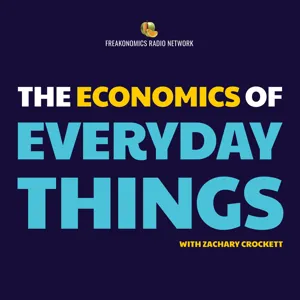Podcast Summary
Fraternities: More Than Just Parties: Fraternities offer long-term financial benefits through effective financial management and a vast network of brothers, despite parties and potential financial mismanagement.
Despite the party image and sometimes questionable financial management, being a member of a college fraternity can have significant financial benefits in the long run. Fraternities function like franchises with national organizations, secret handshakes, and a large network of brothers. Members are responsible for managing the budget, which can be a significant amount of money. When chapters need help with financial management, they can turn to specialists for assistance. The parties and social activities may not align with the fraternity's mission of making gentlemen, but the social capital gained can lead to higher income opportunities after graduation. However, effective financial management is crucial for the sustainability and success of the fraternity.
Financial Commitment in Fraternities: Thousands in Dues and Expenses: Fraternity membership involves substantial financial obligations, including dues to chapter, national org, and governing body, covering rent, meals, maintenance, and insurance, with potential consequences for delinquent members.
Being a part of a fraternity involves significant financial commitment. Members pay dues to their chapter, national organization, and governing body, which can amount to thousands of dollars per year. These funds cover various expenses including rent, meals, maintenance, utilities, social and activity fees, and insurance. Fraternities collectively own billions of dollars worth of real estate, and brothers living in the house are responsible for mortgage payments and property taxes. Delinquent members may face consequences such as having possessions taken or being sent to collections. The financial obligations are necessary to maintain the fraternity house and cover liabilities, which can be expensive due to the high-risk classification of fraternities.
Insurance and Financial Risks for Fraternities: Fraternities face financial risks from lawsuits and hazing, leading to shorter pledge periods and alcohol-free dues. Discretionary funds can be used for events but also lead to questionable decisions. Hierarchy and social order can influence spending. Hazing continues to pose challenges.
Fraternities are required to have substantial insurance coverage to protect against accidents and liabilities, but repeated lawsuits and risks such as hazing, sexual assault, and heavy drinking have led to significant financial settlements. Fraternities have responded by shortening the pledge period and forbidding the use of dues for alcohol. Discretionary funds, which can be substantial, are often used for events and social activities, but can also lead to questionable decisions. The social order and hierarchy of Greek life can also influence spending. Despite efforts to reduce risks, hazing and other dangerous activities continue to pose challenges for fraternities.
Fraternity Members Earn Higher Incomes After Graduation: Joining a fraternity can lead to a 36% income increase, amounting to over $20,000 extra per year, and up to $800,000 over a 40-year career. Fraternity alumni hold a disproportionate amount of power in business, politics, and law.
Joining a fraternity can have significant financial benefits for its members after graduation, despite having lower academic performance in college. A study by economist Stephen J. Schmidt at Union College found that alumni who joined fraternities had an average 36% higher income than those who did not. This financial advantage, which amounts to over $20,000 extra per year, can accumulate to over $800,000 over a 40-year career. Fraternity members have historically held a disproportionate amount of power and influence in business, politics, and law, accounting for 85% of Fortune 500 executives, 3 quarters of US senators, and 85% of supreme court justices since 1910. Fraternities have even established a political action committee, the Frat Pack, to lobby for pro-Greek causes. The reasons for this success are not fully understood, but Schmidt suggests that the social skills and networks built during fraternity membership may be contributing factors.
Fraternity membership offers valuable skills and networking opportunities: Fraternity membership provides soft skills, networking, and potential job opportunities, enhancing personal and professional growth
Being part of a fraternity can provide valuable soft skills and networking opportunities that are highly regarded in the business and political world. These skills, such as effective communication, teamwork, and problem-solving, are not always reflected in academic records. Additionally, the fraternity network can offer access to potential job opportunities and professional growth. Danielle Logan, a professor, has seen firsthand the benefits of fraternity membership, with students securing jobs based on their fraternity connections. Chaz, a sophomore at the University of Illinois Urbana Champaign, has already experienced professional benefits through his fraternity network, landing an internship at IBM. While some may argue that these gains are due to nepotism, others believe that the skills and experiences gained from fraternity life contribute to increased productivity. Ultimately, being part of a fraternity can provide a strong foundation for personal and professional growth.

